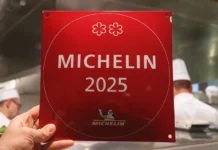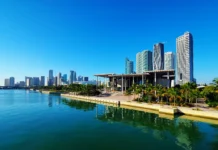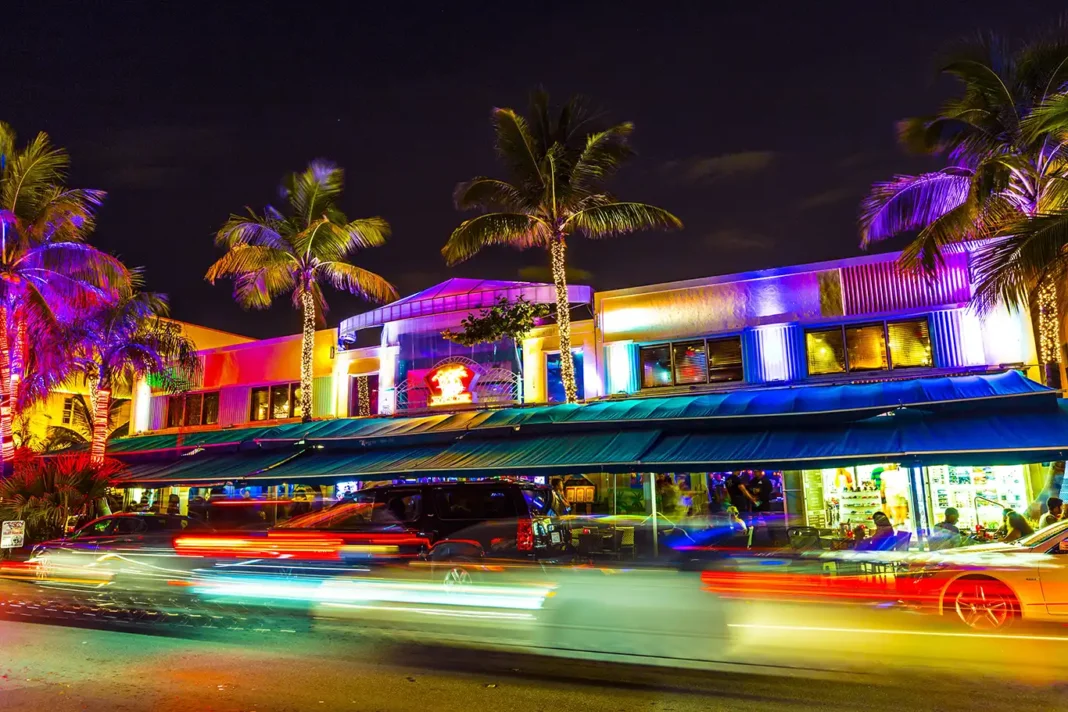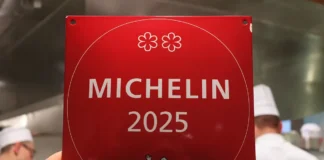Miami’s gastronomy is one of the factors that most attracts residents and tourists to the city. With award-winning restaurants and renowned chefs, the culinary scene not only offers unique experiences but also significantly increases property values in the region.
Estimated reading time: 17 minutes
Miami has established itself as one of the most important gastronomic capitals in the Americas. The city offers a unique fusion of flavors that reflects its cultural diversity, attracting renowned chefs from around the world and creating a culinary scene that rivals New York and Los Angeles.
For those considering real estate investment in Miami, gastronomy is a fundamental factor to consider. Neighborhoods with strong culinary scenes not only offer better quality of life but also show greater real estate appreciation and rental income potential for short-term rentals.
Miami’s Gastronomic Revolution
In the last two decades, Miami has undergone a true culinary revolution that transformed the city into a world gastronomic destination.
Factors that Drove the Transformation
Cultural diversity
- Latino population: 70% of residents have Hispanic origin
- International immigration: Chefs from around the world establishing themselves
- Global tourism: 17 million annual visitors
- Purchasing power: Clientele willing to pay for unique experiences
Infrastructure investment
- New neighborhoods: Wynwood, Design District, Brickell City Centre
- Gastronomic spaces: Markets, food halls, rooftops
- Culinary events: South Beach Wine & Food Festival
- Specialized media: National and international coverage
Related Articles
Main Gastronomic Regions
Each Miami region has developed its own culinary identity, attracting different audiences and impacting the local real estate market.
South Beach
- Gastronomic profile: International luxury and sophistication
- Specialties: Seafood, Mediterranean cuisine, fine dining
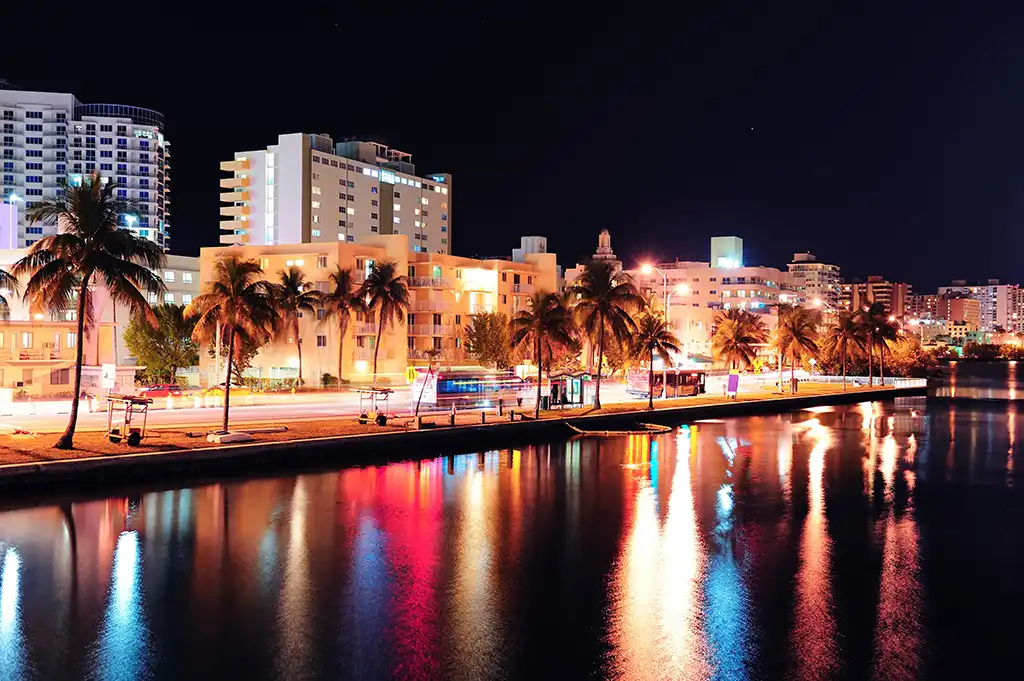
Iconic restaurants
- Joe’s Stone Crab: Tradition since 1913
- The Setai: High-level Asian cuisine
- Stubborn Seed: Innovation from chef Jeremy Ford
Real estate impact
- Appreciation: 15-20% above areas without gastronomic scene
- Rental demand: 30% higher for seasonal rentals
- Resident profile: Executives and luxury tourists
- Average ticket: US$ 80-150 per person
Wynwood
- Gastronomic profile: Creative and alternative
- Specialties: Food trucks, street food, Latin fusion
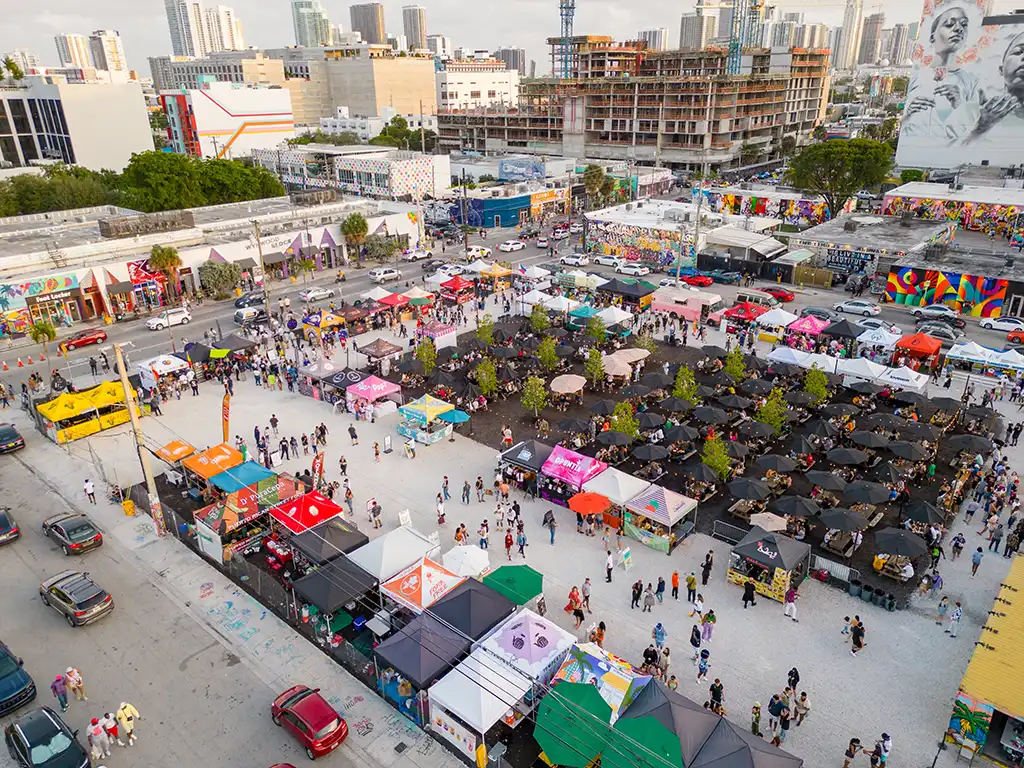
Culinary highlights
- KYU: Modern Asian cuisine
- Coyo Taco: Authentic Mexican food
- Wynwood Marketplace: Diversity in one place
Real estate impact
- Gentrification: 200% appreciation in 10 years
- New developments: Modern condos and lofts
- Resident profile: Young professionals and artists
- Average ticket: US$ 25-60 per person
Brickell
- Gastronomic profile: Executive and international
- Specialties: Business dining, happy hours, rooftops
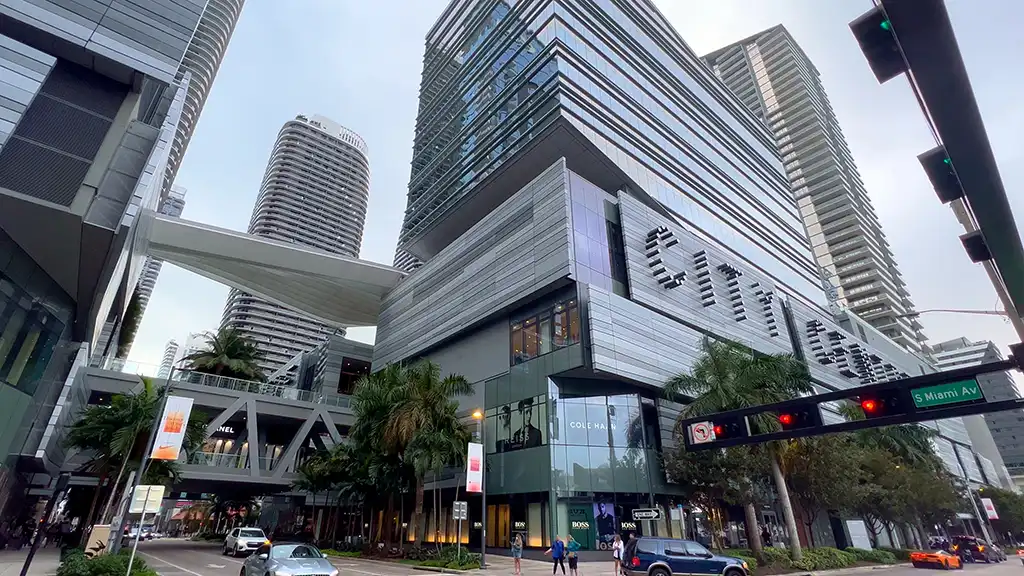
Main establishments
- Zuma: Contemporary Japanese cuisine
- Komodo: Asian fusion in sophisticated environment
- Area 31: Seafood with panoramic view
- Brickell City Centre: Premium food court
Real estate impact
- Convenience: Residents can walk to restaurants
- Appreciation: Condos near restaurants worth 10-15% more
- Resident profile: Executives and international investors
- Average ticket: US$ 50-120 per person
Little Havana
- Gastronomic profile: Cuban authenticity
- Specialties: Traditional Cuban cuisine, cafes, bakeries
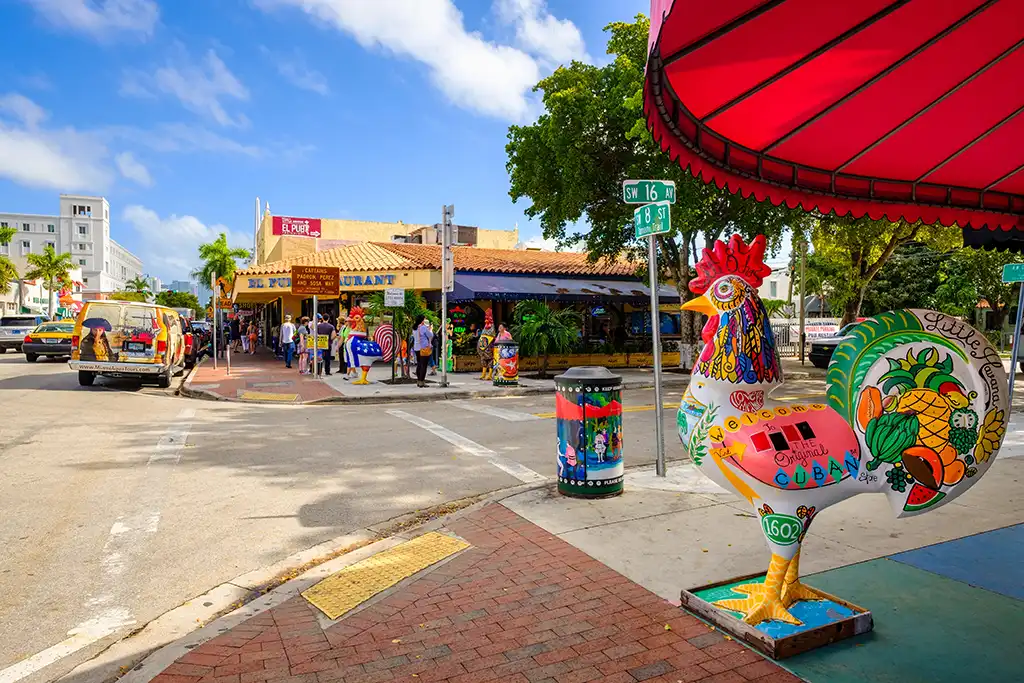
Authentic experiences
- Versailles: Most famous Cuban restaurant
- Ball & Chain: Live music and mojitos
- Azucar Ice Cream: Latin artisanal ice creams
- Domino Park: Street culture and gastronomy
Real estate impact
- Cultural preservation: Maintains accessible values
- Tourism: Attracts visitors interested in culture
- Resident profile: Latin families and young professionals
- Average ticket: US$ 15-35 per person
Coral Gables
- Gastronomic profile: Elegance and tradition
- Specialties: Fine dining, Mediterranean cuisine, wine bars
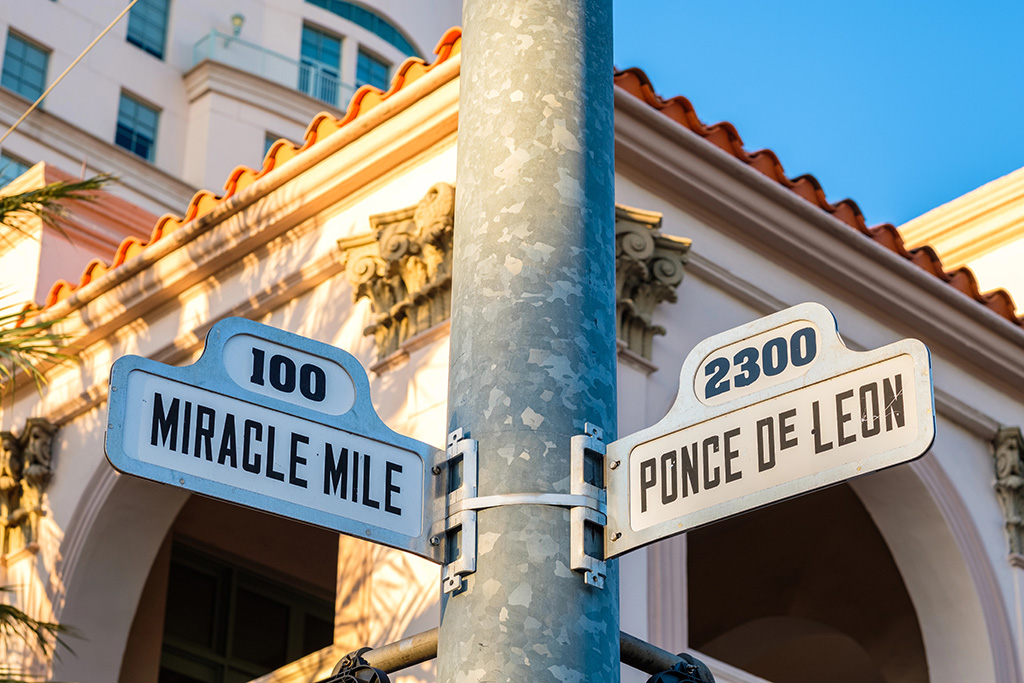
Renowned establishments
- Seasons 52: Seasonal and healthy menu
- Bulla Gastrobar: Authentic Spanish tapas
- The Biltmore (Fontana): Historic and elegant dining
Real estate impact
- Stability: Consistent values and sustainable growth
- Family profile: Attracts high-income families
- Resident profile: Established professionals and retirees
- Average ticket: US$ 60-100 per person
FACCIN – 25 Years in Miami Real Estate
Buy in Miami with Confidence
Chefs Who Transformed Miami
The presence of renowned chefs elevated the local gastronomy level and attracted international attention to the city.
Michelle Bernstein
- Bio
- Specialty: Modern Latin cuisine
- Restaurants: Michy’s, Sra. Martinez
- Impact: Pioneer in fusing Latin flavors with French techniques
- Recognition: James Beard Award, Food Network
José Andrés
- Bio
- Specialty: Contemporary Spanish cuisine
- Restaurants: Bazaar Mar, The Bazaar
- Impact: Brought innovative tapas and molecular gastronomy concepts
- Recognition: Michelin stars, social activism
Jeremy Ford
- Bio
- Specialty: Modern American cuisine
- Restaurants: Stubborn Seed, The Grill
- Impact: Top Chef winner, elevated local culinary standards
- Recognition: James Beard nomination, national reviews
Michael Schwartz
- Bio
- Specialty: Farm-to-table, local ingredients
- Restaurants: Michael’s Genuine, Harry’s Pizzeria
- Impact: Pioneer in sustainable ingredients movement
- Recognition: James Beard Award, mentor to new chefs
Current Gastronomic Trends
Miami is at the forefront of several gastronomic trends that influence the real estate market.
Sustainability and Local Ingredients
Growing movement:
- Farm-to-table: Restaurants with their own gardens
- Sustainable fishing: Local and responsible seafood
- Waste reduction: Composting programs
- Organic ingredients: Partnerships with local producers
Impact on real estate:
- Appreciation: Neighborhoods with organic markets
- Demand: Apartments with urban gardens
- Sustainability: Eco-friendly buildings
Plant-Based Cuisine
Exponential growth:
- Vegan restaurants: 150% increase in 5 years
- Vegetarian options: All restaurants offer them
- Innovation: Plant-based meats and alternative dairy
- Health: Focus on healthy eating
Target audience:
- Millennials: 40% follow plant-based diets
- Conscious tourists: Seek sustainable options
- Athletes: Miami as fitness destination
Food Halls and Gastronomic Markets
Expanding concept:
- Time Out Market: Curation of local restaurants
- Lincoln Eatery: Diversity in South Beach
- MiMo Market: Neighborhood concept in Biscayne
- Aventura Food Hall: Family options
Advantages:
- Diversity: Multiple options in one location
- Prices: Accessibility for different budgets
- Convenience: Ideal for families and groups
- Discovery: Opportunity to try new flavors
Gastronomic Events that Move the City
Miami hosts culinary events that attract visitors from around the world and impact the real estate market.
South Beach Wine & Food Festival

Importance:
- Duration: 4 days in February
- Participants: 60,000+ visitors
- Chefs: 200+ national and international chefs
- Economic impact: US$ 30 million
Effect on real estate:
- Hotel occupancy: 95% during event
- Seasonal rental: 300% higher rates
- Appreciation: Properties near events
- Investment: New restaurants and bars
Miami Spice
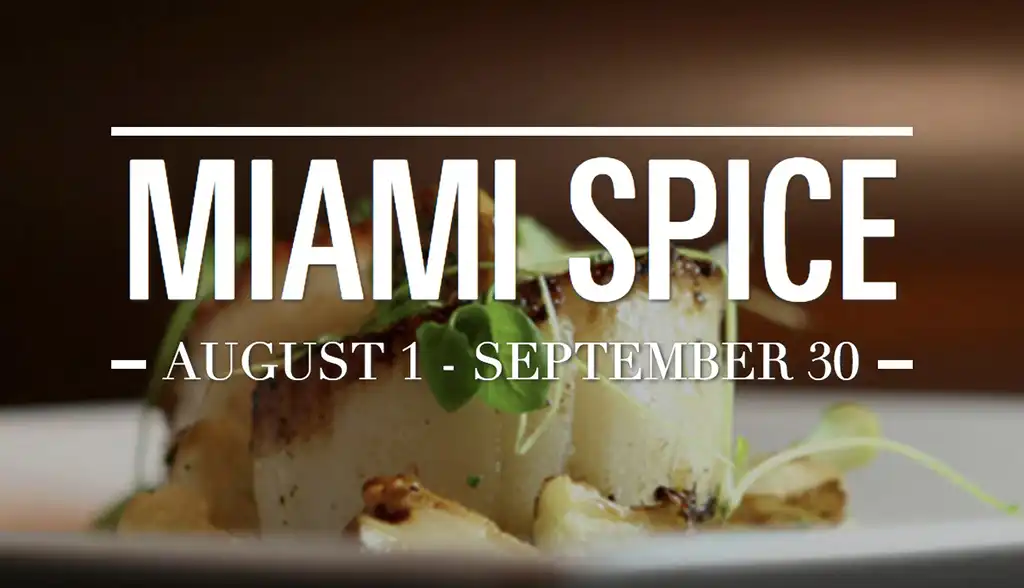
Promotional program:
- Duration: August and September
- Participants: 200+ restaurants
- Discounts: Special menus with fixed prices
- Objective: Attract tourism in low season
Benefits:
- Democratization: Access to premium restaurants
- Discovery: Opportunity to discover new places
- Movement: Increases frequency in all neighborhoods
- Economy: Positive impact on sector
How Gastronomy Adds Value to Real Estate
The presence of a strong gastronomic scene has direct impact on real estate appreciation.
Appreciation Factors
Gastronomic walkability:
- Proximity: Properties 5 minutes from restaurants
- Variety: Diversity of culinary options
- Quality: Presence of award-winning establishments
- Hours: Options for different times of day
Market data:
- Appreciation: 10-20% above regional average
- Sale time: 30% faster
- Rental demand: 25% higher
- Tenant profile: Higher purchasing power
Neighborhoods in Gastronomic Transformation
Some regions are undergoing culinary transformation that impacts the real estate market.
MiMo District (Biscayne Boulevard)
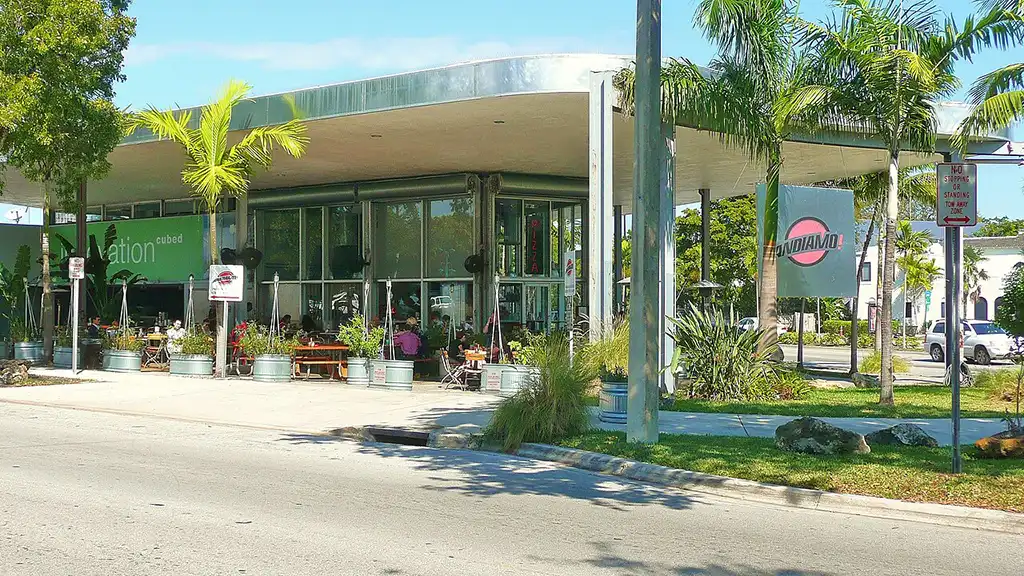
Ongoing transformation:
- New restaurants: 15 openings in 2024
- Investments: US$ 50 million in renovations
- Concept: Casual and accessible cuisine
- Audience: Families and young professionals
Real estate impact:
- Appreciation: 25% in last 2 years
- New projects: 5 residential developments
- Profile: 1-2 bedroom apartments
- Prices: US$ 350,000 – US$ 600,000
Edgewater
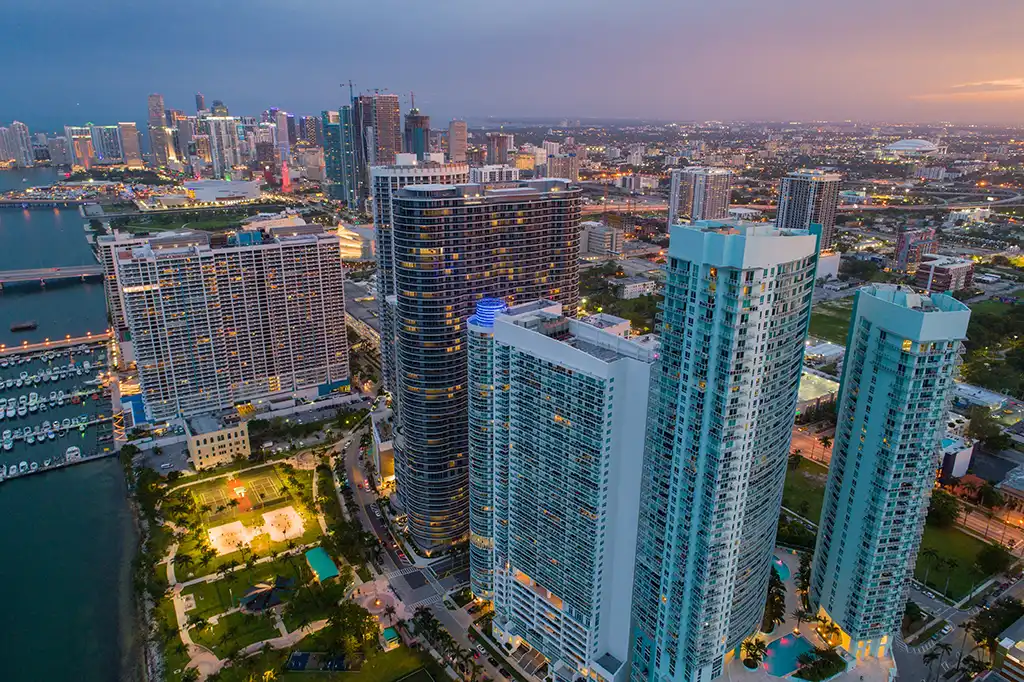
Gastronomic development:
- Bay margin: Restaurants with view
- Diversity: International cuisine
- Prices: More accessible than Brickell
- Potential: Growing area
Opportunities:
- Investment: Still attractive prices
- Development: New projects coming
- Location: Proximity to downtown
- View: Properties with bay view
Tips for Investors
How to use gastronomy as real estate investment criteria.
Location Analysis
Factors to consider:
- Gastronomic density: Number of restaurants per block
- Quality: Reviews and awards of establishments
- Diversity: Variety of cuisines and prices
- Trend: New restaurants opening in region
Research tools:
- Yelp and Google: Reviews and density
- OpenTable: Availability and popularity
- Zomato: Detailed restaurant information
- Time Out: Editorial recommendations
Tenant/Buyer Profile
Who values gastronomy:
- Millennials: 85% consider gastronomy in neighborhood choice
- Professionals: Executives who work a lot
- Tourists: Seasonal rentals
- Retirees: Quality of life and convenience
Gastronomy ROI
Return on investment:
- Appreciation: 2-3% additional per year
- Rental: 10-15% above regional average
- Occupancy: Higher occupancy rate
- Liquidity: Faster sale
Future of Gastronomy in Miami
Trends that will shape the gastronomic and real estate scenario.

Geographic Expansion
New frontiers:
- Homestead: Rural and organic cuisine
- Aventura: Expansion to north
- Doral: International corporate cuisine
- Pinecrest: Family fine dining
Technology and Innovation
Digital transformation:
- Delivery: Service expansion
- Apps: Integrated reservations and orders
- Payments: Contactless systems
- Experience: Augmented reality in menus
Sustainability
Environmental commitment:
- Zero waste: Waste-free restaurants
- Renewable energy: Sustainable operations
- Local ingredients: Reduced carbon footprint
- Packaging: Biodegradable materials
Flavor that Adds Value
Miami’s gastronomy is much more than a culinary experience – it’s a determining factor in real estate appreciation and quality of life. For smart investors, considering the local gastronomic scene is fundamental to maximize returns and attract quality tenants.
Neighborhoods with strong culinary identity not only offer better lifestyle but also present greater appreciation potential and liquidity. Gastronomy has become one of the main drivers of urban development in Miami.
When investing in real estate, remember: you’re not just buying a space, you’re buying a lifestyle. And in Miami, this lifestyle has international flavor and tropical seasoning that conquers the world.






